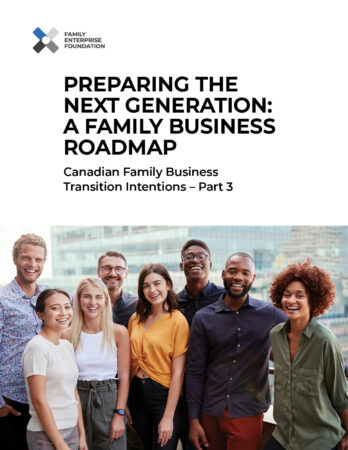
Family Enterprise Foundation publishes report on transitioning the family business
by CM Staff
When family business owners consider their succession journey and the future of their business, often the focus is exclusively on finances and tangible assets.

Latest research from Family Enterprise Foundation on Canadian Family Business Transition Intentions, from the next generation’s point of view. (CNW Group/Family Enterprise Foundation)
OAKVILLE — With the great wealth transfer and transition of family businesses now underway, bridging generational divides, preparing successors and building emotional connections are keys to a smooth succession, finds new research by Family Enterprise Foundation (FEF).
In its latest report, Preparing the Next Generation: A Family Business Roadmap, FEF conducted a deep dive into the perspectives of the next generation of family business members to identify strategies to help all generations be more aligned when transitioning business ownership and management. This research aimed to identify barriers to a successful transition and how business families can better prepare their next generation successors.
“Given that ownership of more than 60 per cent of family enterprises is expected to be handed off within the next decade, this is a crucial moment for the generations on each side of the transition. Much is at stake, not only for the family business but for the family’s wealth, reputation, legacy and family harmony… not to mention for the national economy” says Bill Brushett, President and CEO, Family Enterprise Foundation.
When family business owners consider their succession journey and the future of their business, often the focus is exclusively on finances and tangible assets. However, previous FEF research revealed that next generation preparedness is the primary cause of concern in intergenerational succession. So, while financial considerations should always remain a part of the larger picture, the future of a family’s legacy lies in its human capital and the effective preparation of the next generation.
In-depth interviews with next generation family business members identified five practical strategies to help both generations prepare for the transition process:
- Foster early involvement and emotional connectedness: Nurture strong emotional bonds to the family business through early exposure and involvement, which helps to measure and to build interest.
- Train and prepare: Create a comprehensive training and preparation program for the next generation. The program should feature both formal and informal learning structures and may involve experience gained outside the business.
- Encourage mentorship and peer interactions: Encourage peer interactions and mentorship to provide the next generation with a robust network to learn from and lean on throughout their career. Surprisingly, nearly all study participants received guidance from a mentor.
- Find the right role: Rotational programs are an effective way to help next gens find the right role in the business. However, most respondents believe the next generation should not be forced or expected to play a role in the business. They should only be involved if they are fully aware of the responsibilities of ownership and are passionate about the opportunity.
- Involve trusted advisors: External advisors are cited by participants as among the most desired and beneficial supports for family enterprises. Involve advisors who are specifically trained to work with business families to help maintain harmony by opening communication and improving transparency.